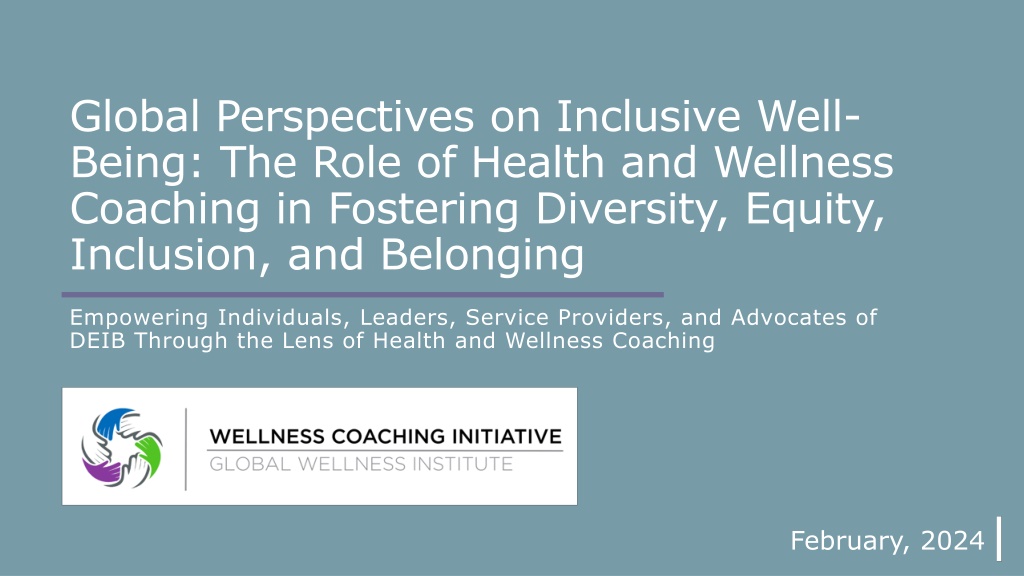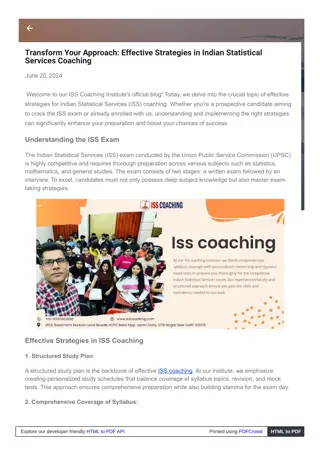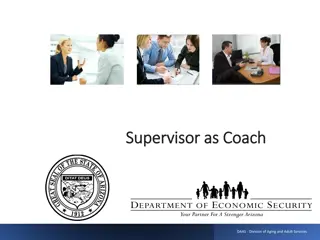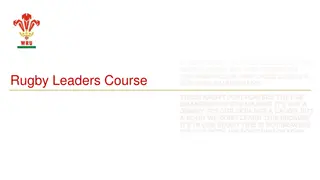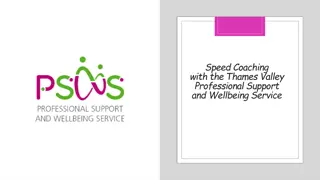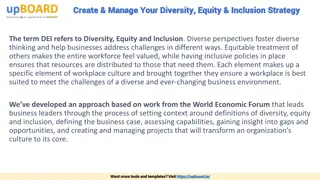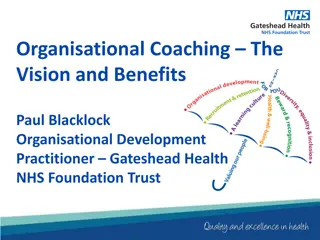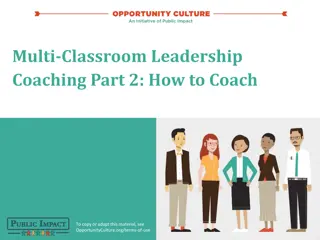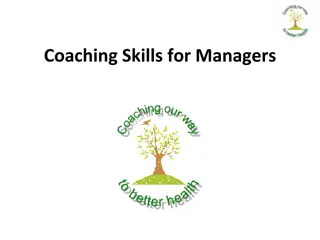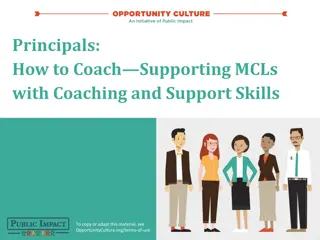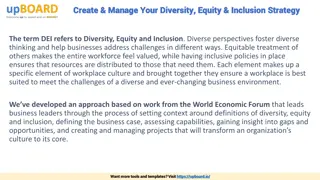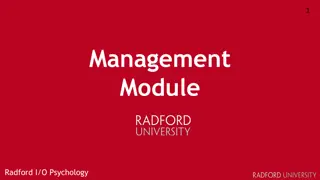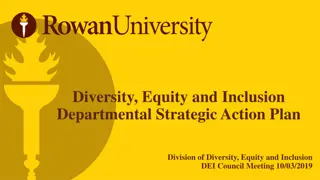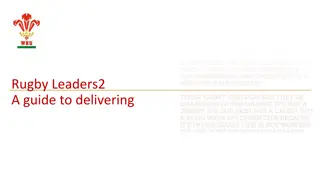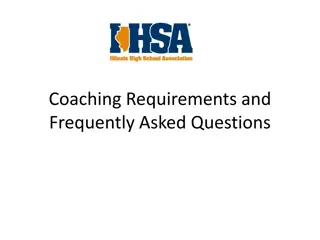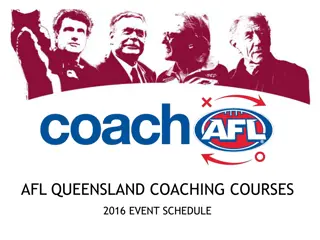Global Perspectives on Inclusive Well-Being: Fostering DEI Through Health Coaching
Explore the pivotal role of health and wellness coaching in promoting diversity, equity, inclusion, and belonging worldwide. This comprehensive guide presents real-life examples and insights to empower individuals, leaders, and service providers in creating positive change. Discover how Health and Wellness Coaches aid in reframing DEI in a well-being context, supporting various forms of diversity, and advocating for a more inclusive future.
Download Presentation

Please find below an Image/Link to download the presentation.
The content on the website is provided AS IS for your information and personal use only. It may not be sold, licensed, or shared on other websites without obtaining consent from the author. Download presentation by click this link. If you encounter any issues during the download, it is possible that the publisher has removed the file from their server.
E N D
Presentation Transcript
Global Perspectives on Inclusive Well- Being: The Role of Health and Wellness Coaching in Fostering Diversity, Equity, Inclusion, and Belonging Empowering Individuals, Leaders, Service Providers, and Advocates of DEIB Through the Lens of Health and Wellness Coaching February, 2024
Purpose: to offer guidance and insight to individuals, leaders, service providers, and advocates of DEIB worldwide. Reframe Understand Clarify Provide Increase DEI(B) in a well- being context the distinct and valuable role played by Health and Wellness Coaches in fostering Diversity, Equity, Inclusion, and Belonging the distinct and valuable role played by Health and Wellness Coaches in fostering Diversity, Equity, Inclusion, and Belonging awareness of the current global context of Diversity, Equity, Inclusion, and Belonging Provide resources to help leaders and providers inform, educate, and create the ripple effect of positive change
Present real-life stories, testimonials or studies weve termed Voices from the Field , illustrating the true effectiveness of Health and Wellness Coaching in the specific domains of Diversity, Equity, Inclusion, and Belonging encompassing: Race and Ethnicity Age and Generations Gender Sexual Orientation Religious and Spiritual Beliefs Disability Socioeconomic Status and Background Neurodiversity Health Status Weight Stigma and Body Image
Definition of DEI & B I. II. Why DEIB Today III. Reframing DEIB in a Well-Being Context IV. Definition of Health and Wellness Coaching V. Health and Wellness Coach Training for DEIB VI. Definition of well-being VII. Types of Diversity: What it is Why it matters How HWC can support this type of diversity? Voices from the Field 1. Race and Ethnicity 2. Age and Generation Diversity 3. Gender 4. Sexual Orientation 5. Religious and Spiritual Diversity 6. Physical Disability 7. Socio-economic Status and Social Determinants of Health 8. Health Status 9. Neurodiversity and ADHD 10.Weight Bias and Stigma VIII. Closing the case for DEIB through Health and Wellness Coaching VIV. What s being done X. The Diversity of Health and Wellness Coach Specialties XI. Final Thoughts, Calls to Action, and Conclusion XII Questions for Discussion Guide XIII. Inclusive Language Glossary and Resources Overview 5
I. Definition of DEIB
Structural inequality and bias are global phenomena Diversity: proportionate representation across all dimensions of human difference. Inclusion: everyone is included, visible, heard, and considered. Belonging: everyone is treated and feels like a full member of the larger community and can thrive.
II. Why DEIB Today
A 2020 survey conducted by Fortune and Deloitte revealed that 96% of CEO s agree that DEIB is a personal strategic priority History Workplace diversity training emerged following equal employment laws, AA, etc. Technology advancing, diversity is fabric of modern society Social Movements (George Floyd, Me- Too, etc.) Increasingly complex and interconnect ed world Financial incentives for organiza- tions Global Migration Increased loneliness Globalization 1960 largely ineffective incentive for change 2023
III. Reframing DEIB in a well-being context
Connected & Synchronized Well- Being DEIB Mental & Physical Health
Social-Ecological Model of Health: Health is affected by the interaction between individual, group/community, physical, social, and political environments. Society Community Relationship Individual
IV. Definition of Health & Wellness Coaching
Health and Wellness Coaches work collaboratively with individuals and groups in a client-led process that supports the client in working toward self-determined health and wellness goals. Coaches support and encourage clients to become masters of their own health, wellness, and overall well-being. (Global Wellness Institute Global Coaching Initiative, 2022)
Medical Coaching is a coaching methodology that enables clients to develop emotional, mental and physical resilience in a medical crisis or challenge . Medical Coaching Institute, 2011)
V. Health & Wellness Coach Training for DEIB
Credentialing Health and Wellness Coaching is not credentialed or regulated globally. Industry leaders include: National Board of Health and Wellness Coaches (NBHWC- USA) UK Health Coaches Association (UKHCA) Health Coach Association of New Zealand/Australia (HCANZA) Health Coach Alliance in Canada (HCA).
Accredited (NBHWC, ICF) Training Encompasses Cultural Competence & Awareness Intersectionality Communication & Active Listening Bias Awareness & Mitigation Inclusive Language & Practices Knowledge of Health Disparities & Social Determinants of Health Ongoing Professional Development Lifelong Cultural Humility Coaching Ethics
VI. Definition of Well- Being
Health and Well-Being are inextricably linked. "Health is a state of complete physical, mental, and social well-being and not merely the absence of disease or infirmity. WHO
Potential Sources to Cultivate Well-Being Potential Sources to Cultivate Well-Being Nourishment/Quality Nutrition Environment & Surroundings Mindfulness/Reflection Contributions/Meaning/Purpose Intellectual Stimulation Financial Stability Spirituality Self-Awareness Opportunities for Growth Altruism & Impact Self-Direction & Agency Constructive Relationships Connection/Community Rest & Recovery Constructive Emotions Creativity & Play Nature & Sunlight Movement/Physical Activity
VII. Types of Diversity (11) What it is Why it matters How HWC can support this type of diversity Voices from the Field
VII. 1. Race & Ethnicity 2. Age & Generation 3. Gender 4. Sexual Orientation 5. Religious & Spiritual 6. Physical Disability 7. Socio-economic Status & Social Determinants of Health 8. Health Status 9. Neurodiversity & ADHD 10. Weight Bias & Stigma
Intersectionality Intersectionality, through the lens of DEIB, recognizes that individuals may encounter simultaneous forms of discrimination and marginalization. Emphasizes that these various forms of oppression are intricately connected and cannot be comprehended in isolation.
1. Race and Ethnicity
Adopt inclusive practice that promote equity and empower individuals from diverse backgrounds Actively cultivate cultural competence through education: cultural norms, beliefs, etc. Engage non-judgmentally, fostering a sense of inclusivity and trust Advocate for elimination of systemic barriers contributing to health disparities Tailor plans to consider the specific factors impacting clients from different racial and ethnic backgrounds. Adopt culturally sensitive communication strategies, mindful of language Serve as advocates for diversity within the HWC profession helping clients feel seen, understood, and supported, ultimately breaking down biases and fostering a more equitable approach 1. Race & Ethnicity: HWC support
2. Age & Generation Diversity
Align distinct values for every generation Focus on age-appropriate health and well-being Support preventative health: key to longevity Encourage Health behaviors supporting 70% of aging Create supportive environment, adding years to life Help recognize ageism and age-related bias in healthcare and in general Foster inclusivity by creating a safe and judgment-free space 2. Age & Generations
Educate on the latest research and best practices in addressing gender and gender identity health disparities Raise Awareness to help clients recognize when they are facing gender and gender-related health disparities Help clients increase emotional agility and develop behavioral strategies to cope with events of gender and gender-related health disparities and discrimination Help clients create tailored responses and interventions to address specific reoccurring gender and gender-related health disparities and discrimination Empower clients by addressing the mental effects of gender-related discrimination, such as stress, anxiety, depressive states, low self-esteem, and lack of confidence Promote health literacy and data collection to help clients educate themselves about their health and social rights 2. Gender
4. Sexual Orientation
Foster equality, and inclusivity by recognizing and respecting different sexual orientations Keep abreast of current research, trends, and best practices in LGBTQ+ healthcare Cultivate an inclusive and welcoming space supporting all sexual orientations Employ an open, humble, and curious line of questioning 4. Sexual Orientation
5. Religion & Spirituality
Explore with curiosity and compassion the deep beliefs of individuals focusing on the individual nature of people Take a holistic approach beyond physical body to encompass mental, emotional, social, and spiritual Engage in active listening to hear the heart and soul of individual Seek to understand what connects individuals to the world and gives their life meaning Support individuals to cultivate a deeper relationship with self, others, and the greater universe or God Provide a level of trust and compassion to create space for processing health status and behavioral change that connect to an optimistic perspective on life 5. Religion & Spirituality
Communicate at eye level to build a relationship with a person with a physical disability Foster inclusivity by creating a safe and judgment-free space Be sensitive in approaching and interacting without judgement Address the presence of disability and its effect on daily living Communicate strengths, values and goals, positive psychology, previous successes, recognize and address emotional barriers, build resilience 6. Disability
7. Socio- economic Status & Social Determinants of Health
Embrace population approach that situates individuals in context Recognize and address the impact of socioeconomic status and social determinants of health Foster inclusivity by creating a safe and judgment-free space Learn more about social determinants of health to tailor guidance to each client's unique circumstances Empower clients by providing education and resources that enhance their understanding of how social determinants impact health outcomes Advocate for social justice and address systemic barriers 7. Socio- economic Status & Social Determinants of Health
8. Health Status
Recognize unique health needs to tailor support to specific circumstances Collaborate with healthcare professionals to ensure clients receive coordinated care Help reduce stigma related to mental health and certain conditions, facilitating help-seeking behaviors Promote health literacy, empowering clients to make informed decisions 8. Health Status
9. Neuro- diversity & ADHD
Address specific health-related challenges: adherence to medication, exercise, nutrition, stress management, and substance abuse (primarily caffeine and nicotine) Tailor strategies: supporting clients in organizing tasks, managing distractions, regulating sleep patterns, supporting emotional regulation, techniques for memory enhancement Guide individuals to establish effective communication with their healthcare team Undergo specialized training to effectively work with Neurodiverse populations Facilitate group discussions on mental well-being and neurodiversity, actively breaking down barriers and stigmas to promote inclusivity and open dialogues 9. Neuro- diversity & ADHD
10. Weight Bias & Stigma
Challenge weight bias and promote body acceptance Recognize that health is multifaceted and influenced by various factors beyond weight Support clients in setting realistic and sustainable health goals that align with their values and preferences Are mindful of the impact words can have on an individual's mental and emotional well-being Empower clients to become advocates for their own health and well-being by supporting them in developing self-compassion, body acceptance, and resilience to combat weight stigma Recognize scope of practice, and refer clients to appropriate professionals Foster inclusivity by creating a safe and judgment-free space 9. Weight Bias & Stigma
VIV. What s being done
National Board of Health and Wellness Coaching (NBHWC) Statement on social justice Integration into ethics
International Coaching Federation (ICF) 54,177 members Over 140 nations All generations Diversity statement in the 2022 ICF State of Diversity White Paper
UK International Health Coach Association 900 members. 20 countries and nationalities. Equality, Diversity, and Inclusion Policy Statement. Participating in the NBHWC s Diversity, Equity & Inclusion Committee
Health & Wellness Coach Specialties Stress Management Coaches Medical Coaches End of Life Coaches Family Caregiver Nutrition Coaches Fitness Coaches Chronic Disease Management Coaches Mental Health and Well-Being Coaches Smoking Cessation Coaches Weight Loss Coaches Holistic Health Coaches Lifestyle Coaches Corporate Wellness Coaches Cancer Wellness Coaches Pregnancy and Postpartum Coaches Senior Health Coaches Youth and Teen Health Coaches Gut Health Coaches Wellness Coaches for Specific Populations Wellness Coaches for Specific Conditions Wellness Coaches for Aging in Place Addiction Recovery Coaches Holistic Nutrition Coaches
Calls to Action! Champion Health and Wellness Coaching Embrace Multicultural Competency Build Inclusive Spaces Implement DEIB Initiatives Support Mental Health and Neurodiversity Advocate for Policy Changes Engage in in Continuous Learning Encourage Calling In-Out Culture
